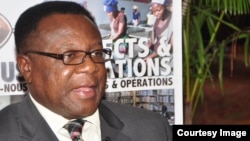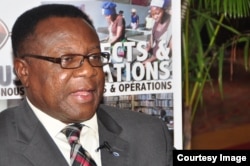Over the past 15 years, many African countries have enjoyed double digit growth rates. Africa as a whole is expected to grow by up to 4.5 percent over the next two years, according to the United Nations Economic Commission for Africa.
Experts say Africa needs as much growth as possible to handle a population bulge of young people who will add to the number of job seekers.
Prof. Emmanuel Nnadozie is Executive Secretary of the African Capacity Building Foundation (ACBF), a Pan African organization that aims to build human and institutional capacity for good governance and economic development.
He says there are several factors behind the impressive gains, including fewer civil wars. But he says economic management has also improved, thanks in part to 35 national policy think tanks supported by his Harare-based organization, the African Capacity Building Foundation.
Policy research institutes
Among them are two institutes based in Nairobi: the Kenya Institute for Public Policy Research and Analysis (KIPPRA) and the African Economic Research Consortium (AERC).
"We know that all these are the ones that are doing the analysis that helps the government to make evidence-based policies," he said. "You have got to understand what the problem it is that you’re trying to solve and you have got to understand exactly what kinds of solutions would be appropriate for those problems. We have seen this happen in Ethiopia where the unemployment issue was addressed head-on based on the work that was done by [another] institute created by the Africa Capacity Building Foundation. They also tackled the inflation problem. You go to Senegal and you’ll find the same situation. Here in Nairobi, Kenya, KIPPRA is doing the same thing -- helping the Kenyan government to make the kind of policies that will benefit Kenyans and promote social and economic development."
Nnadozie says the Africa Capacity Building Foundation has trained up to 45,000 economic policy managers and policy-makers on the continent. It also supports the placement of women in government. and promotes regional trade and integration.
Youth bulge
However, he says challenges lie ahead.
There are still low intensity conflicts in Africa, and the threat of terrorism from groups like the Somalia-based Al-Shabab and the Nigeria-based Boko Haram.
There is also a large percentage of young people on the continent seeking jobs. Those who can’t find work join other migrants escaping conflict or political repression.
T"hat’s something that requires serious and urgent attention and cannot be left to continue to exist.," said Nnadozie. "This is also tied to the serious problem of youth unemployment which if you look at practically every country on this continent, this is a nagging problem. We must do something to provide the right kinds of education and skills for Africa’s young person, which also provides opportunities to be employed or to employ themselves and employ others."
Leaders of the world’s seven top industrialized counties gather in early June for the G7 summit in Germany. Preceding the meeting will be several events looking at ways of increased Africa in global trade. In addition, many African heads of state will attend what is called outreach meetings with G7 policymakers – where investments and economic reforms will be discussed. Leaders from Nigeria, Liberia, Nigeria, Senegal and Tunisia are among those expected to attend.
Nnadozie says Africa leaders at that meeting --- and at all global economic forums -- need to speak in one voice.
:The challenge African countries face in international engagement and negotiations often is that they are not as prepared as their counterparts that they are going to be facing," he said. "When you are not as well prepared you just don’t maximize on the benefits that you get from these kinds of engagement."
Nnadozie is an optimist. He says there’s no comparison between Africa today and at the time of independence, when there were few university graduates, roads, schools or hospitals. Today, it’s home to some of the world’s fastest growing economies. Their success will depend on deepening trade and cooperation, and good economic management.






